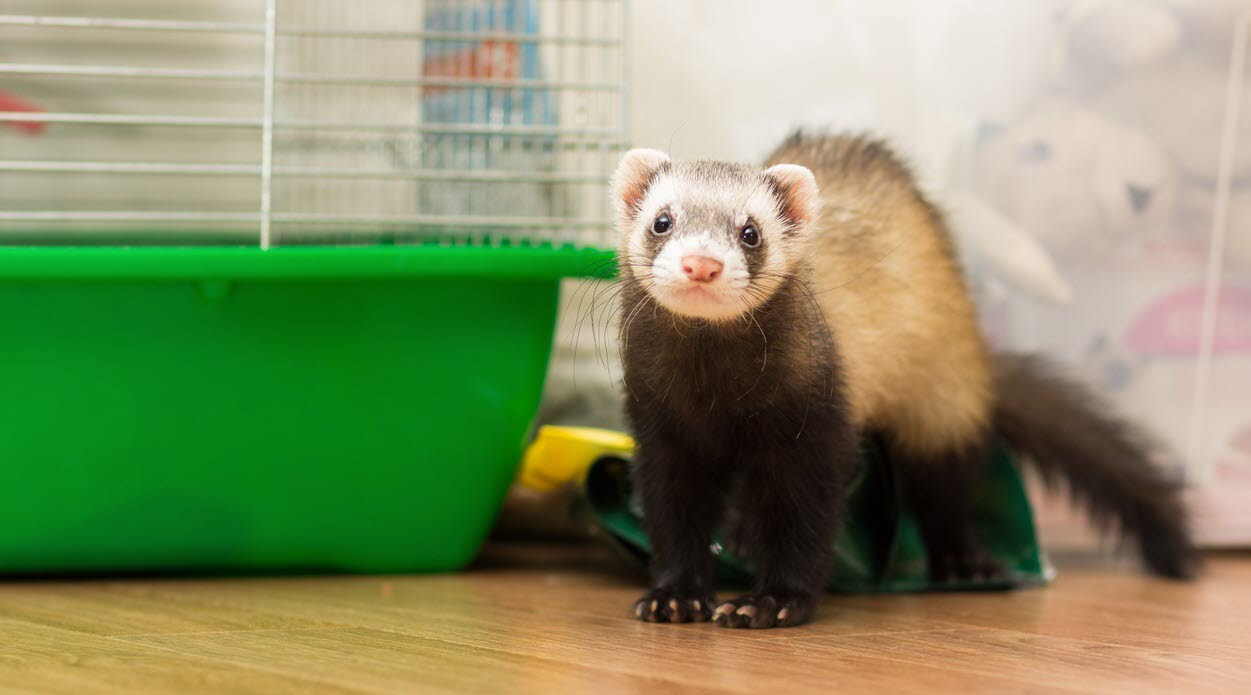Keeping ferrets as pets

Ferrets are a cheeky and fun-loving member of the Mustelid or weasel family. They are technically a domesticated European polecat and can make excellent pets, especially for those living in smaller houses or apartments.
Ferrets are small, generally short-coated mammals with long slinky bodies and small feet. A ferret’s life span ranges from 5 to 10 years and they can weigh up to almost two kilograms. They come in an almost endless variety of colours, including sable, albino, sandy and silver.
Like many animals, if ferrets are not used to human handling, or if they are hurt or frightened, they can bite – and they do have quite a strong jaw! However, if handled from a young age, ferrets can make very cuddly and interactive pets.
What housing does a pet ferret need?
Ferrets are very clean animals and can be successfully kept indoors. Like cats, they can be easily trained to use a litter tray containing shredded paper and they groom themselves regularly. To keep your ferret safe, an indoor cage is also recommended. It is crucial to ensure any cage is large enough for a ferret to turn around, stretch and walk around in. It must also be well ventilated and situated in a position that will avoid any large temperature variations. Ferrets can easily suffer from heat stress so avoiding direct sunlight in summer is important. Ferrets have delicate feet, so placing padding or carpet over any bars on the cage floor is recommended.
Apart from giving these playful, social creatures a snug sleeping area, such as a hammock, their cage also needs to provide adequate enrichment. This could be in the form of having multiple cage levels, tunnels, hammocks and ideally a companion ferret. Obviously, the more ferrets you have in a cage, the larger it needs to be.
Ferrets are easily bored, so it is important to allow them to safely explore outside their cage daily. This will also allow you to have time to cuddle and play with them.
Do ferrets get along with other animals?
Unfortunately, although ferrets are fun-loving, they are also a predator for other small animals. It is not recommended that they be kept with rabbits, rodents, small reptiles, fish or birds. They can, however, often happily co-exist with dogs or cats but it is important to supervise them around other pets, especially if they are not familiar with each other.
What do ferrets eat?
Ferrets are obligate carnivores, meaning that to stay healthy their diet must be comprised of meat and animal products. A vegetarian or high fibre diet is not appropriate. Commercial ferret food is available, and they can also be fed high-quality dry kitten food.
How often does a pet ferret need to see the vet?
Ferrets can contract canine distemper virus and require a yearly vaccination to prevent this. Your veterinarian will perform a general health check at the time of vaccination. They are also prone to mite infestation, so a good parasite prevention plan (including gastrointestinal worming and heartworm prevention) is essential. Ferrets can also develop hairballs and may require grooming as they get older.
Finally, it is very important to have your ferret desexed. Aside from preventing unwanted breeding, female ferrets who remain unmated develop oestrogen toxicity. This can cause life-threatening bone marrow disease and anaemia (low red blood cell levels). Desexing your male ferret can also reduce the strong odour which they produce and decrease the incidence of ferrets fighting.
Overall, ferrets can be truly joyful, playful and interactive pets, if they are handled correctly and provided with adequate companionship and enrichment.
